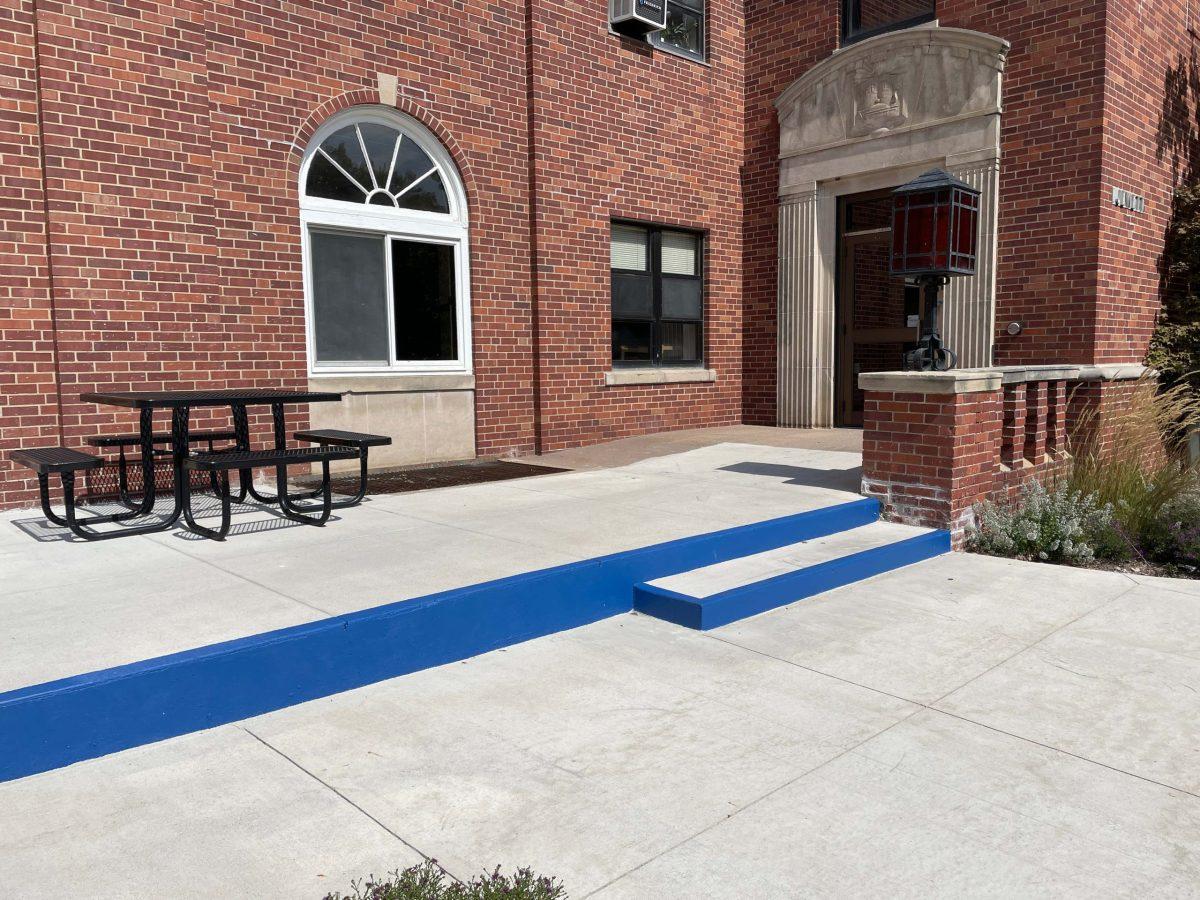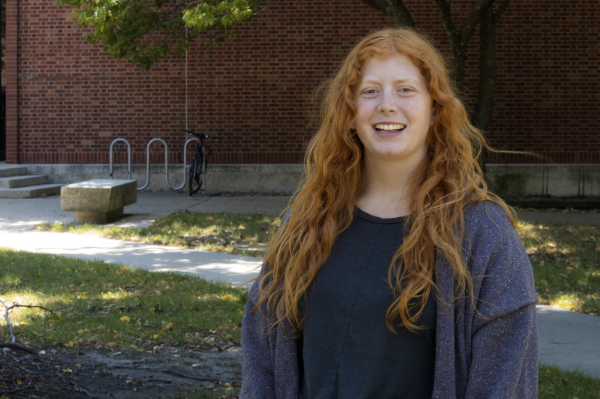When sophomore Ava Basso noticed that there were no contrast lines — non-slip, contrasting markings on the edge of steps to differentiate one from another — on the stairs leading to Jewett Hall, she decided to bring up the issue. Basso said once she sent the email, the disability task force agreed to do it quickly.
“It is structurally accessible, but there is no contrast, so there are a lot of sighted people or just able-bodied people and obviously disabled people tripping up and down those [stairs], so it was dangerous,” Basso said.
Basso is the diversity, equity, inclusion and justice chair for the Resident Hall Association. Through her work, Basso ensures that events hosted by RHA are accessible and inclusive. She collaborates with the Harkin Institute and Access and Success, among others.
Basso leads the disability task force, which handles everything related to disability and accessibility at Drake.
Basso said that the growth mindset displayed by Drake allows them to make Drake as inclusive as possible. She finds that the institution is willing to fix or add infrastructure to ensure students are accommodated.
“I find that everybody on this campus is very open to learn and grow,” Basso said. “They take into consideration students and our opinions and what we would like to see instead of just following whatever ADA [mandates] we need to. They actually want students’ opinions, so that they can make Drake as inclusive as possible.”
Basso said that she hopes to see Drake grow and take student input to make Drake students feel comfortable and like being on campus.
“I want everybody to feel like they should be here, and I want to make campus as accessible as possible,” Basso said.
A disability inclusion club named Disability Coalition is in the works, according to Basso.
Additionally, graduate student Matthew Williams worked with the President’s Office to propose the Presidential Committee on Supporting People with Disabilities in the spring of 2023. Williams described the committee’s first meeting as productive and as setting the stage for building an inclusive campus.
“I am thankful for the opportunity to be part of this big opportunity for us to take stock in what we do well and turn out a path to excel in other areas as well,” Williams said. “This university has opened so many doors for me, and I really want to make sure that can continue to happen for people who come after me.”
While researching different graduate schools, Williams noticed that Northern Illinois University had a similar committee, and he wanted to bring it to Drake. He drafted a proposal for President Marty Martin, and within 90 minutes of emailing him, Williams got a reply requesting a meeting about his proposal.
Williams believes that Drake is creating an inclusive campus. However, he also thinks that there are always ways to improve.
According to Williams, the committee presents an opportunity to systematically look at the entire campus and figure out how to make the Drake community more inclusive. Williams plans to focus on every element of someone’s experience at Drake from facilities to technology to the employee and student experience rather than just buildings.
“We can become the model of one of the most inclusive campuses for people with disabilities in the world,” Williams said.
Venessa Macro, chief administrator officer at Drake, chairs the President’s Committee on Supporting People with Disabilities. Macro previously interned for Sen. Tom Harkin when he was drafting the Americans with Disabilities Act in 1988.
Macro said the committee discussed developing a guiding plan for future inclusive efforts. She wants accessibility and inclusion to be integrated into Drake’s everyday decision-making.
“How are we [the committee] not just a list of things to do, but a framework for planning to continue to do this work year in and year out,” Macro said.
Macro and the committee are currently working on a line of open communication. Macro said they want to hear from all parts of the university to ensure the committee focuses on Drake as an entire institution.
Macro said that there are obvious problems and then ones they will learn after talking to the students and staff about their experiences.
“The role of this committee is really what is the best practice and how do we make sure that becomes a part of the fabric of the Drake culture,” Macro said.
Basso finds the university is focused on becoming more inclusive.
“We have room to grow. I feel like every campus to some extent has room to grow, but Drake is on the path of growing,” Basso said. “We are more open to accommodate faster than a lot of other colleges because Drake has the funds and the means to do so.”
Basso added that the accessibility staff understands why accessibility is important and why it should be a priority. According to students interviewed, working with Access and Success has been a positive experience.
“Brooke and Michelle are some of my favorite people on campus,” sophomore Talia Prozument said about the Access and Success staff. “They are super helpful communicating with professors, setting up accommodations and checking in with you.”
Prozument recommended everybody utilize Access and Success and stressed the importance of communication, specifically saying to reach out to professors first regarding accommodations.
“Don’t be afraid to ask for help because it is not easy being a college student in general. College is hard, but then you add health issues and you add disabilities, and it is a lot harder,” Prozument said.
According to Prozument, Drake needs to focus on ramps and buttons. For her, one of the most frustrating things on campus is that the Hubbell side of Olmsted does not have a ramp and many ramp-accessible doors do not have handicap push-buttons.
“All doors should have buttons. I feel like that would make the world a lot easier for everyone,” Prozument said.
Prozument added that even when a button is implemented, they don’t always work.
“It is just a hit or miss type of thing,” Prozument said. “People tend to be very aggressive with door buttons, not realizing how sensitive they are and [that] they break super easily.”
Additionally, she explained how Howard and Old Main are the most inaccessible buildings on campus. Last year, Prozument had a class in Howard, and she ended up having to take the class via Zoom because the classroom was too small for her to navigate with her wheelchair.
Prozument explained the small things that make a building inaccessible. For example, the Old Main ramp has an inch or two separating the brick surface and the ramp, so she could not get on to it with her old wheelchair.
“All of the buildings have their own inaccessible issue,” Prozument said. “In society, people will try to find loopholes. I like to find loopholes too, but it is a little bit tricky when it comes to accessibility and people trying to find loopholes. They will be like ‘it meets the ADA requirements,’ but [the] ADA isn’t totally up to date and there are a lot of loopholes around it.”
Another goal of the students interviewed is disability education, with the committee focusing on integrating disability into Drake’s diversity and inclusion education initiatives.
“When you talk about diversity and inclusion, disability is a part of that, but no one ever talks about it,” Williams said. “That is everywhere, and if we can do that here at Drake that just starts the impetus for other places around the world.”
Prozument said that as a first-year student last year and a PMAC this year, the changes Drake made to the DEIJ session this year were incredible, specifically within inclusion for people with disabilities.
“I felt very seen as a Drake student to hear directly from someone with a disability who was an alum speaking on their experience,” Prozument said.
Prozument said Drake should prioritize reaching out to students to see what they need. There is a large variety of disabilities and needs, so Drake should never assume what is needed, she said.
“It is really important for campus as a whole to recognize that there are changes to be made all around for even those with invisible disabilities,” Prozument said. “Honestly, if they were to just send out a Google form to all of campus saying ‘what are accessibility needs that we need to improve?’, I feel like so many responses would pop up and there would be such a variety.”
Prozument said that making campus more accessible is valuable to all. She praised the attitudes of clubs and professors, saying that they were great about setting up accommodations and reworking some things so she could participate.
“95% of my experiences have been good,” Prozument said. “It is just a matter of finding routes to classes that are accessible and finding ways to do things that may look a little different.”








